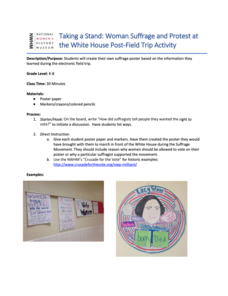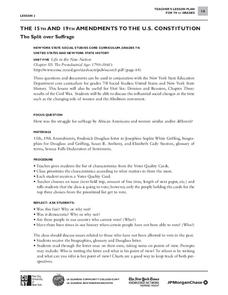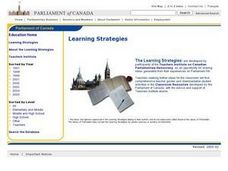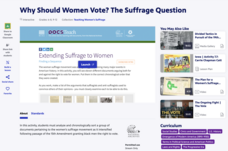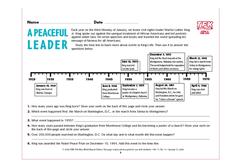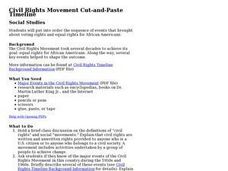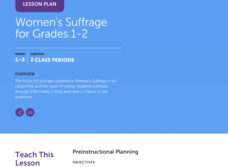National Woman's History Museum
Taking a Stand: Woman Suffrage and Protest at the White House K-8
A class discussion opens a lesson plan on women suffragettes. Learners imagine they are preparing to protest for women's voting rights. Scholars create a colorful poster to hold up high when marching in front of the White House.
City University of New York
The 15th and 19th Amendments to the U.S. Constitution
Who gets to vote? Learn more about struggles for suffrage throughout United States history with a lesson based on primary source documents. Middle schoolers debate the importance of women's suffrage and African American suffrage before...
Curated OER
Social Movements and Constitutional Change: Women's Suffrage
The class analyzes a series of documents intended to show the events that lead to women gaining the right to vote. They play a Tic-Tac-Toe style game, make a time line with sequencing cards, and review the 4 steps of social change....
Facing History and Ourselves
The Audacity of a Vote: Susan B. Anthony’s Arrest
Susan B. Anthony's speech "Is It a Crime for Women to Vote?" takes center stage in a lesson that asks class members to consider how they might respond to what they consider an unjust law. Groups work through the speech paragraph by...
Curated OER
Why Can't I Vote?
Fourth graders take an unannounced test (failure is expected) and the top scores are rewarded with candy bars. They compare this test to the literacy tests given before 1960 and votes to candybars. They journal their responses.
Anti-Defamation League
Martin Luther King, Jr. and Civil Rights
How far have we come and how far do we still need to go to achieve equality and full civil rights in the United States? Include a packet of materials collected in your observance of Martin Luther King, Jr. Day.
Curated OER
The Voting Game
Upper graders play the voting game to help them understand voting patterns, political movements, and build a content specific vocabulary. Each student creats a chart to determine if his or her political view veers liberal or...
Stanford University
Civil Rights Act of 1964
Was JFK a fallen Civil Rights hero—or a fraud? Learners examine Kennedy's own words and those of his critics to decide for themselves. After examining Kennedy's actions before his assassination, they determine what sort of legacy he left...
Curated OER
How Women Got the Vote: The Story of Carrie Lane Chapman Catt
Students participate in a simulation and compare and contrast the arguments for and against womens' right to vote. In this civil rights lesson, students simulate disenfranchisement of women by allowing only half of the class to vote on a...
Curated OER
Civil Rights Movement
In this social studies activity, students find the words that define the civil rights movement and the answers are found at the bottom of the page.
DocsTeach
To What Extent was Reconstruction a Revolution? (Part 2)
While Reconstruction laid the groundwork, many believe its revolutionary ideals weren't realized until the 1960s Civil Rights Movement. Using the 1965 Voting Rights Act, budding historians consider why it took more than 100 years to...
National Woman's History Museum
Propaganda and Women's Suffrage
Americans who backed the suffragist movement used posters to gain the support of others for their cause. Class members analyze the visual imagery and propaganda devices used in a variety of these posters. In addition, groups examine how...
C-SPAN
Last Days of Martin Luther King, Jr.
On April 4, 1968, Dr. Martin Luther King, Jr. was assassinated in Memphis, Tennessee. Four video clips reveal the events of that time, including the shift in the focus of the Civil Rights Movement, the aftermath of the assassination, and...
Curated OER
It is Our Right-Don't Waste It!
Learners explore the basic rights granted to all American citizens by the U.S. Constitution in the light of women's issues. The women's suffrage movement, the role of Susan B. Anthony, and the timeline of events on voting rights are...
Curated OER
Responses to Discrimination During the Civil Rights Period
Students examine the effects of discrimination. In this American Civil Rights Movement lesson, students participate in a classroom activity that requires them to personally feel the effects of discrimination. Students then explore...
Curated OER
The Election of Barack Obama 44th President of the United States
Students consider the historic implications of Barack Obama's election. In this election of 2008 lesson, students research Obama's accomplishments and determine how his election signifies the success of the American Civil Rights...
PBS
Why Should Women Vote? The Suffrage Question
An online interactive activity asks learners to analyze a group of documents related to the women's suffrage movement and then place the documents on a timeline. The results assess users understanding of the progression of the women's...
Time For Kids
A Peaceful Leader
The legacy of Dr. Martin Luther King, Jr's life and message is just as important today as it was in his lifetime. Introduce elementary learners to the movement for civil rights with a timeline of Dr. King's life, as well as comprehension...
Curated OER
Civil Rights Movement Cut-and-Paste Timeline
Learners put into order the sequence of events that brought about voting rights and equal rights for African Americans. The creative project can be made very crafty by having students cut out the timeline to be combined with others in a...
Scholastic
Women's Suffrage for Grades 1–2
Scholars take part in a grand conversation after they examine facts and stories about the Women's Suffrage Movement. Eight discussion questions bring light to influential women, the importance of voting, citizenship, and voting rights.
Anti-Defamation League
Shirley Chisholm: Unbought, Unbossed and Unforgotten
A 13-page packet introduces high schoolers to a lady of amazing firsts. Shirley Chisholm was the first Black woman elected to Congress, the first Black woman to run for President of the United States, and a leader of the Women's Rights...
EngageNY
Grade 11 ELA Module 2: Unit 2, Lesson 2
How did Elizabeth Cady Stanton advocate for women's rights? Pupils consider this question as they continue reading "An Address by Elizabeth Cady Stanton." They complete a Quick Write, analyzing how satire and sarcasm advance the author's...
Curated OER
The Progressive Movement
While the Progressives never formed a political party they did develop an ideology. Provide viewers with an interesting, yet challenging presentation on the Progressive Movement that introduces key individuals and highlights key events...
Curated OER
Civil Rights Movement in America
Eleventh graders explore the Civil Rights movement as a culmination of history and cultural perspectives developed from the Slave Trade and Reconstruction. They identify leading persons and organizations and their personal philosophy to...


